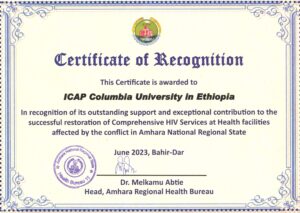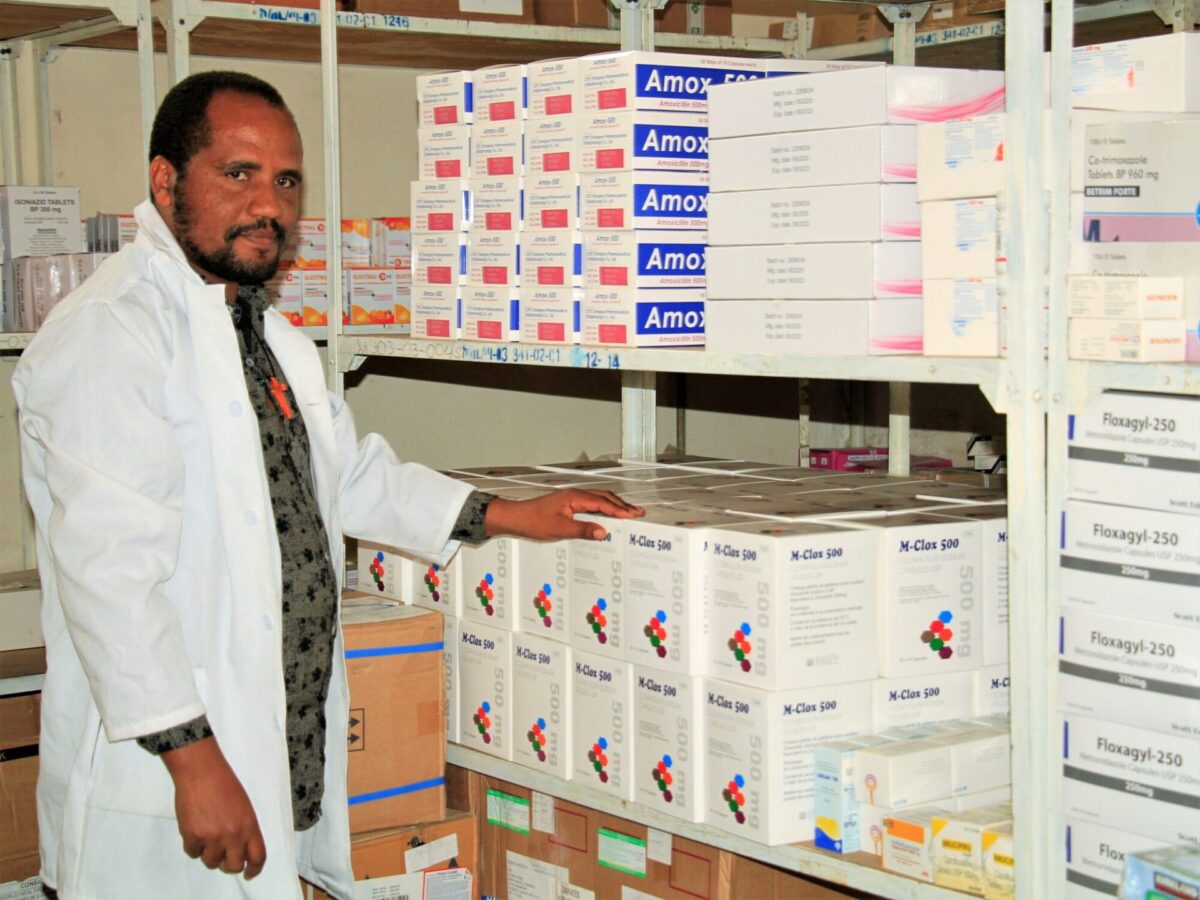Ethiopia’s Amhara Regional Health Bureau recognized ICAP last month for its effective and timely support of the bureau’s emergency response efforts to restore HIV services and antiretroviral treatment (ART) in 65 health facilities partially or fully destroyed during a recent armed conflict.
“We were afraid it would take us longer to restore ART services given the magnitude of the damage,” said Feleku Mekonnen, head of the North Wollo Zone Health Department, part of the Amhara Region. “However, ICAP’s emergency response to facilities affected by the war was fast, highly coordinated, and targeted at restoring the standard of HIV care. Had it not been for ICAP’s rapid response, most of the ART facilities would have remained nonfunctional.”
In April 2021, an armed conflict erupted in the eastern part of Ethiopia’s Amhara region that lasted for 12 months, and devasted its health system. Over 149,000 people living with HIV in Amhara were receiving lifesaving treatment at the time—more than any other region in the country —but the violence disrupted services and damaged health facilities. As a result, the number of people accessing ART in the area at the conflict’s epicenter dropped drastically from almost 67,000 people to around 4,000.
ICAP—in collaboration with the United States Centers for Disease Control and Prevention and the Amhara Regional Health Bureau—quickly responded to the emergency, beginning with a rapid assessment that informed the development of an operational plan to restore ART services to the affected areas. It then formed an emergency response team that recovered electronic medical records and provided training to health care workers to enable them to provide treatment in an emergency context.

ICAP also supported the purchase and distribution of medical equipment and other critical supplies for the hospitals and health centers that had been partially damaged or destroyed in the conflict. This enabled the restoration of HIV diagnoses and treatment services, in addition to cervical cancer screening and treatment. Additionally, ICAP launched a campaign to bring back patients who had discontinued ART during the conflict, starting with an intensive patient tracing orientation for 345 health care workers, done in close collaboration with Ethiopia’s Ministry of Health and the Amhara Regional Health Bureau.
As a result of ICAP’s support, comprehensive HIV prevention, care, and treatment services were restored at 65 health facilities, and the number of patients on ART increased to 68,682 as of January 2023. Remarkably, viral load testing coverage increased from 48 percent at the end of the conflict to 90 percent by January 2023, illustrating the significant impact of ICAP’s work in improving the accessibility and use of viral load testing services among eligible patients.

One of the 65 health facilities left damaged by the armed conflict in Amhara Region, Ethiopia.

The electrical system at Dessie Comprehensive and Referral Hospital was destroyed during the conflict.
“In collaboration with the Regional Health Bureau, ICAP restored the health information system in the conflict-affected health facilities. It has also continued its unwavering support in the regional HIV program by strengthening the laboratory system and human resource capacity building in the post-conflict period,” said Dr. Gashu Kindu, deputy head of the Amhara Regional Health Bureau.
“This well-deserved recognition acknowledges ICAP’s extraordinary dedication and continued support, which have undoubtedly brought measurable achievements in restoring the regional HIV program and services,” Kindu said.
“This is the first experience of its kind for ICAP to engage in a post-conflict emergency reform program like this,” said Zenebe Malaku, MD, ICAP’s country director in Ethiopia. “ICAP’s commitment remains unwavering as we continue to provide similar vital support to other conflict-affected regions in Ethiopia to ensure continuity of provision of comprehensive and quality HIV services.”
About ICAP
A major global health organization that has been improving public health in countries around the world for two decades, ICAP works to transform the health of populations through innovation, science, and global collaboration. Based at Columbia Mailman School of Public Health, ICAP has projects in more than 40 countries, working side-by-side with ministries of health and local governmental, non-governmental, academic, and community partners to confront some of the world’s greatest health challenges. Through evidence-informed programs, meaningful research, tailored technical assistance, effective training and education programs, and rigorous surveillance to measure and evaluate the impact of public health interventions, ICAP aims to realize a global vision of healthy people, empowered communities, and thriving societies. Online at icap.columbia.edu








